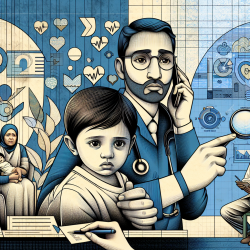Mandatory reporting of child maltreatment is a critical process designed to protect children from abuse and neglect. However, the effectiveness of this process hinges significantly on the perspectives and experiences of those involved—particularly children and their caregivers. A recent meta-synthesis of qualitative studies provides valuable insights into these perspectives, offering practitioners crucial information to improve their practice.
The Importance of Communication
One of the key findings from the study is the fear and anxiety that both children and caregivers experience regarding mandatory reporting. This fear often stems from a lack of communication and understanding about what mandatory reporting entails. Practitioners can play a pivotal role in alleviating these fears by clearly explaining the process, including the limits of confidentiality and what situations may lead to a report.
Building Trust with Caregivers
Caregivers often feel threatened by the possibility of being reported, which can lead them to avoid seeking necessary services or disclosing important information. To counteract this, healthcare providers should focus on building trust through empathetic and non-judgmental communication. By establishing a partnership based on honesty and support, practitioners can encourage caregivers to engage more openly with services that benefit both them and their children.
Enhancing Practitioner Training
The study highlights a significant need for improved training for healthcare providers and child protective services (CPS) personnel. This training should encompass not only the technical aspects of mandatory reporting but also cultural competence and an understanding of the unique circumstances faced by vulnerable groups. Such knowledge empowers practitioners to respond more effectively and sensitively to each case.
Collaborative Approaches
Effective mandatory reporting requires coordinated efforts between various sectors involved in child welfare. By fostering collaboration between healthcare providers, CPS workers, and community organizations, practitioners can help create a more integrated system that minimizes punitive responses and maximizes support for families.
Research Gaps and Future Directions
The meta-synthesis underscores the urgent need for further research into the impacts of mandatory reporting laws on children and caregivers. Specifically, there is a lack of data on children's direct experiences with these processes. Understanding these experiences is crucial for developing child-centered strategies that prioritize their safety and well-being.
Conclusion: A Call to Action for Practitioners
Practitioners have a vital role in shaping how mandatory reporting processes are perceived and experienced by children and caregivers. By implementing strategies that enhance communication, build trust, improve training, and foster collaboration, they can mitigate potential harms associated with reporting. As we continue to explore these dynamics through research, practitioners must remain committed to refining their approaches for the betterment of those they serve.
To read the original research paper, please follow this link: Children’s and caregivers’ perspectives about mandatory reporting of child maltreatment: a meta-synthesis of qualitative studies.










